- Home
- Julia London
Seduced by a Scot Page 11
Seduced by a Scot Read online
Page 11
When she reached her room, she shut the door behind her and leaned against it, her eyes closed, taking deep breaths to calm her heart. Her bag was still where she’d left it, just inside the door, as Mr. Bain had instructed. She knelt next to it and held her breath as she opened it up. Her heart began to beat like a thousand wings when she looked inside, because there it was, her necklace, lying serenely on top of her few things.
She felt a swell of gratitude and esteem so profound for Mr. Bain that she sagged against the wall. She had her necklace and her pride returned to her, and she would never forget his kindness in this, the risk he had taken on her behalf.
Maura quickly rearranged things and put some clothing on top of the necklace. When she was satisfied it could not be seen, she changed out of the awful gown Mrs. Garbett had lent her and left it lying in a heap on the floor. She pulled on a moth-eaten chemise and one of her older plain gray gowns with a fraying hem and fabric worn bare at the elbows. She washed her face and hands, brushed her hair and braided it, then moved to the bed. She did not pull back the coverlet, but lay down in her clothing on top of it.
She was ready. As soon as there was light, she was ready to leave the Garbetts behind her forever. Funny, wasn’t it, that a few weeks ago, she was desperate to stay. Now, she was so desperate to leave that it left her breathless.
She wished for Mr. Bain. She wanted to press her cheek against his chest and cling to him for warmth, for safety. She had trusted him. How remarkable it was that she had, for she hardly knew him. But of all the people in her life, she trusted him more than anyone. He was the only one who had not betrayed her in one way or another.
Mr. Bain was the only soul in this world who stood firmly in her corner.
At least for now.
CHAPTER TWELVE
NICHOL OUGHT TO be bloody furious with Miss Darby and her machinations, the wee little fool. Had she once considered that the engagement might have been called off because of her dancing? Had she once considered that her dancing would have not only risked their plan and his reputation, but could have seen them tossed out on their arses before he had an opportunity to fetch her bloody necklace? On one hand, it could have doomed him irreparably—not only would he have failed to have done as he promised, he’d have been the catalyst for the failure by bringing her back here.
But on the other hand, he had to give her credit. Her brazen bid to dance with Adam Cadell had ended in a predictable contretemps, which had created the perfect diversion for Nichol. He’d found the necklace precisely where she’d said, left carelessly on Sorcha’s vanity.
Miss Darby had what she’d come for, and as soon as the sun rose above the tree line, they would be on their way. It wasn’t yet dawn, but he’d already been downstairs to inform Bagley they’d need horses readied and brought around. He’d returned to his room, was lying on his bed fully dressed, his feet crossed at the ankles, his arms pillowing his head, thinking.
In hindsight, he wished he’d never mentioned the necklace to Garbett. Not because he was afraid he would be suspected—that was a given, just as soon as it was noticed missing. But because he didn’t want Mrs. Garbett to have the satisfaction of knowing Miss Darby desired to have it back. In some ways, the woman reminded him of his own father. Unyielding. Willful. An insufferable inability to ever be wrong. Last evening had felt all too familiar to him—he’d lived in a home much like this, had been made to feel a stranger in that home, had been made to feel a trespasser.
A sudden image from his childhood popped into his head—his father standing in his room, staring at him, his expression murderous. In the open door, his younger brother, Ivan, was trembling. “What have I done, Pappa?”
He’d been ten years old. What could he possibly have done?
His father, cold as ice, had said, “Give me the pocket watch.”
Nichol’s heart had skipped when his father held out his hand for it. The pocket watch had belonged to his maternal grandfather, a man Nichol remembered with great fondness and warmth. His grandfather had given him the watch one bright summer day. This is for you, lad, he’d said. Keep it close and you’ll have a wee bit of me with you forevermore, will you no’?
Nichol had scampered out of his bed, and at first, had refused to hand it over. “It’s mine,” he’d said, which had earned him a hard slap alongside his head.
“It doesna belong to you, it belongs to my son. Give me the pocket watch,” his father had commanded again through gritted teeth.
Nichol had begun to cry helplessly as he retrieved the pocket watch from his dresser and handed it to his father, and then in turn had watched him hand it to Ivan. Nichol had been confused by his father’s remarks, for he was as much his son as was Ivan.
Ivan had looked startled and helpless. He knew what the watch meant to Nichol. His hand was shaking when his father had shoved him, had exhorted the eight-year-old to “be a man,” and had pushed the watch into his palm. But Ivan had looked up at his brother and said, “I’ll keep it safe for you, on my word.”
“Donna be a fool,” his father had chastised him. Nichol remembered the cold draft he’d felt as his father had quit his room, as if a ghost had left it.
He never saw the pocket watch again.
The very next morning, he was roused by a footman, told to bathe and dress. And without any explanation, he’d been sent away, to apprentice with the Duke of Hamilton. He’d had no inkling that he was to be sent off, no time to prepare for it, no time to say goodbye to his brother. He didn’t know the Duke of Hamilton, and he’d been frightened. He’d stood on the drive, fighting tears, as his father railed at him not to cry.
But as he’d been handed into the coach, before the footman could close the door, Ivan broke free and ran to him, clambering inside as their father shouted at him to return. “Here,” he’d said, and had pressed something into Nichol’s hand. “I shall miss you, Nic,” he’d said.
That was all he was allowed to say before their father had removed him from the coach and the door was shut.
When Nichol uncurled his fingers, he saw their grandfather’s signet ring, his gift to Ivan.
Nichol had been touched, and had pocketed the ring, keeping it on his person since then. Of course he’d always understood that his father favored Ivan, but Ivan had borne his own cross when it had come to their father. Everyone who knew the man bore that cross.
Nichol wondered idly how many nights he’d lain awake, trying to fathom his father’s disdain for him. How many times had he tried to appease the old man, but to no avail? His father had, from the time Nichol could remember, resented his presence. When he returned to his boyhood home after his schooling at St. Andrews, he’d been met with hostility and an invitation to leave Cheverock and Comrie, the small village where his father, the Baron MacBain, presided. Ivan was a young man then, too, and he had tried to bridge a gap between Nichol and his father, but without success.
Nichol had left for good then, determined to make his way in this world. He’d changed his name to Bain so as never to be associated with William MacBain again. He’d wandered across Europe, in search of something, anything, to hold on to, to call his own, to cherish. But he found it difficult to trust others, and questioned the sincerity of others toward him. It seemed the closer anyone got to him, the farther away he wanted to be.
He’d eventually settled for his nomadic life, took some comfort in his work, which, incidentally, he’d fallen into quite by accident, when a friend, in a moment of drunken idiocy, had challenged a Frenchman to a duel. Nichol’s handling of that debacle had recommended him to another Frenchman, who had a disagreement with his neighbor, a powerful count.
Nichol had hardly thought of his father these last few years, other than to wonder yet, from time to time, what he’d ever done to deserve his father’s revulsion. It was still unfathomable.
But he’d made his own way. He needed neither his fath
er’s approval nor his money. After thirty-two years, Nichol felt nothing but dread when he thought of him. The only time he could be aroused to any emotion at all was when he was witness to someone else being treated poorly.
Nichol would never understand what Maura Darby could possibly have done to deserve her poor treatment at the hand of the Garbetts. She’d been a lass when she’d come into their care, and they’d had a moral responsibility to treat the child well.
An hour or more passed. He heard people moving about in the house, heard the horses snorting and shaking their heads on the front lawn. He rose, went to the basin, washed and combed his hair. He gathered his things and made his way downstairs, and found the household at breakfast. He had no interest in the food or anything else they had to offer—his only interest was in leaving here with Miss Darby, in finishing the venture he’d been paid to undertake, in moving on from the unpleasantness that he’d found in Stirling.
He asked a footman to send word to the kitchen that they’d need food to take with them. Then he walked into the breakfast room to make the formal declaration of their departure.
The family was seated and the tension between them all palatable. The Cadells hardly spoke, and Sorcha picked at her food.
“Mr. Bain,” Mr. Garbett said cheerily. “Will you no’ join us?”
“No thank you,” he said. “As soon as the lass comes down, we’ll be on our way.”
“At the very least, break your fast, lad,” Mr. Garbett tried.
Nichol shook his head. To sit with them was to convey approval of them, and he did not approve.
He heard the sound of someone on the stairs, and a moment later, Miss Darby was striding like a soldier down the corridor to him. She was wearing a plain gray gown that, at the very least, fit her well, but looked worn. Her hair hung in a long black braid down her back.
She stepped into the dining room and curtsied to Mr. Garbett. “I beg your pardon sir, I should no’ like to interrupt, but I should like to thank you again.”
Mrs. Garbett muttered something under her breath as she buttered a slice of bread.
“Will you no’ eat, Maura?” Mr. Garbett offered. He was obtusely ignorant of the animosity around that table—even Mr. Adam Cadell dared not look up.
“No, thank you,” she said primly.
“Well, then,” Nichol said, and exchanged a look with Miss Darby. “Shall we, Miss Darby?”
“Aye,” she said, her voice low, her eyes glittering. He understood her perfectly—she was as desperate to be away from here as he was.
“Now?” Mr. Garbett asked, and pushed his chair back to stand. His napkin was still tucked into his collar. “Bring her cloak, Bagley.”
The butler nodded and went from the dining room. He returned a moment later, the cloak in hand, and as he fit it around Miss Darby’s shoulders, the chambermaid hurried in, scurrying around the table to where Sorcha was sitting.
Miss Darby turned her back on the room, as if she meant to leave then and there.
“Maura! You canna go without wishing us well,” Mr. Garbett said. He opened his arms wide as if to embrace her. “How I shall miss you! You must write us, aye? We’ll want to know how you fare as mistress of Luncarty.”
Were the events of the last month completely lost in Garbett’s mind? Did he truly think she was willingly, happily, going off to marry a man of her choice?
“Thank you, sir, but I donna think anyone will want to hear from me.”
“Oh, donna fret about our Sorcha,” he said gregariously as the chambermaid whispered in Sorcha’s ear. “She’ll be quite all right once she is a missus, that she will. That’s the only bee under her bonnet.”
Adam Cadell looked as if he might break into tears.
Adam’s father stood from the table and offered his hand to Nichol. “Thank you, Bain, for repairing this predicament for us.”
As though the lass’s life was a mere complication for his son.
“Pappa!” Sorcha suddenly cried, and stood so hastily that her chair fell over. A footman scrambled to right it.
“Diah, lass, must you shout?” Mr. Garbett said, and pressed a thick hand to his chest, startled by her outburst. “Aye, what now?”
“My necklace!” she said, her voice gone hoarse. “It is missing.”
Nichol suppressed a groan. It was the chambermaid who’d told her, no doubt to save her own skin. He’d hoped for a bit of time to get away from Garbett House before it was discovered. He glanced at Miss Darby; the blood had drained from her face. She gripped her ratty bag so tightly that he could see the whites of her knuckles.
“You’ve only misplaced it,” Mr. Garbett said dismissively, and turned back to Nichol.
“What do you mean?” his wife snapped, standing, too. “Hannah? What do you mean it is missing?”
“M-miss Sorcha, she left it on her vanity, she did. It’s no’ there now.”
“It’s been stolen!” Sorcha cried, glaring at Maura.
“Aye, Sorcha, we heard her, all of us! Will you please stop shouting? Now, Hannah, lass, I’m certain it is there. Go and have another look, then.”
“I beg your pardon, sir, but it’s no’ there.”
“She took it!” Sorcha said, pointing at Miss Darby.
“What?” Miss Darby said, her hand pressed to her chest as if she’d been struck. “On my word, I would never, Sorcha!”
“She took it, Pappa! That’s why she came back, aye? She didna want her things, she wanted to ruin me and steal my necklace!”
How quickly the necklace had become the property of Miss Sorcha Garbett in her mind.
Mr. Garbett looked curiously at Miss Darby, but Miss Darby looked like a trapped animal, her gaze raking over all the faces staring at her now. “I did no’ take it!” she insisted.
“What good is your word?” Mrs. Garbett asked with a snort. “Surely, husband, you’ll no’ allow her to leave without looking through her things. Your daughter is quite right—Miss Darby came here to take something from us. When she could no’ have Adam, she took the necklace!”
“Donna be absurd,” Mr. Garbett said. “We’ll clear this up here and now, shall we? Maura may have made a mistake or two,” he said blithely, as if any of this could possibly be her fault, “but she’s no thief. Let us have a look, lass,” he said, and held out his hand for her bag.
Miss Darby’s grip tightened. She looked helplessly to Nichol.
“Come on, then, Maura, let us have it, aye?” Mr. Garbett said again, and extended his hand closer to her.
Miss Darby looked as if she might faint. She glanced uncertainly at Nichol again.
“Give it,” he said softly.
Her expression changed instantly, her gaze hardening, her mouth set in a frown of disgust. Of course she believed he’d betrayed her.
She slowly handed the bag to Mr. Garbett, who thrust it at his daughter. “Here,” he said sharply. “If you accuse the lass, then you do the searching, aye?”
Sorcha took the bag and went down on her knees with it, placing it on the floor before her, pulling out the few articles of clothing within. When she reached the bottom of the pile, she turned the bag over. It was empty.
“There, you see? You accuse her falsely, Sorcha! That was badly done! There is no necklace in there, of course no’! Were I you, I’d ask your maid what she’s done with it.”
“How dare you accuse Hannah!” Mrs. Garbett said angrily. “What of him?” she said, pointing at Nichol.
“Him? The man we’ve paid so handsomely to take her away, then? You’re mad, wife.”
Nichol shrugged out of his coat and held his arms wide. “You may search all you like, Mrs. Garbett,” he said.
The woman colored. She kicked the bag away from her daughter’s feet, then drew Sorcha back to the table.
Nichol calmly bent down and gathered Miss Darby’
s things and returned them to the bag. “We’ll take our leave now,” he said, and with his hand firmly on Miss Darby’s elbow, he wheeled her about and strode down the hall with her.
Miss Darby kept her head down, her jaw firmly clenched as they sailed out of the Garbett residence.
“Maura, lass, please,” Mr. Garbett pleaded, walking after them with his napkin still tucked into his collar. “Donna be cross with us, aye? Any reasonable person might have made that mistake, is that no’ so?”
“Goodbye, Mr. Garbett,” she said, and turned her head when Nichol lifted her into the saddle. He strapped her bag to the back of the saddle, then put himself on the back of his mount.
Mr. Garbett hovered around them. “But...you will write, will you no’?”
Miss Darby flatly ignored him. Nichol took her reins, set their horses to a trot, and left Mr. Garbett standing in the drive with that napkin lifting in the breeze.
They rode in silence for a quarter of an hour, down the long drive, onto the road again. Nichol had things to explain, that he knew, but he thought they would stop at the inn at Stirling once more, fill their bellies, and he’d explain all.
Miss Darby had other ideas. She abruptly yanked the reins from him and then pulled her horse to a stop.
“What are you doing?” he asked.
Her response was to swing off the mount, landing awkwardly and bumping into the horse. Then she began to walk up the road. Actually, she strode off, her arms swinging, as if to war. Nichol watched her, curious as to how far she would go if he didn’t stop her. “Where are you going, then?” he called after her.
“Away from you! I owe you nothing, Mr. Bain! I lived up to my end of the bargain, but you! You betrayed me! You’re no better than them!”
Nichol hopped off his horse and walked after her. “If you will halt in your march, I’ll explain—”
She gave a bark of hysterical laughter and whirled about. “Do you think me so feeble that I need an explanation? It is all quite clear! Did you lose your nerve? Did you deem me suddenly unworthy of your assistance? Were you so concerned about your precious reputation that my life and my concerns no longer mattered?” she railed at him.

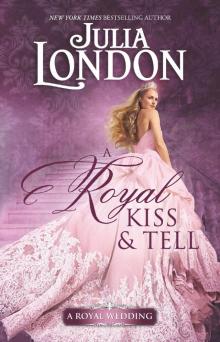 A Royal Kiss & Tell
A Royal Kiss & Tell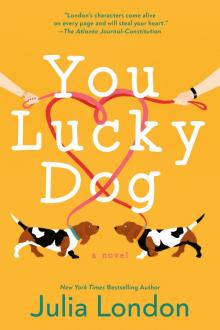 You Lucky Dog
You Lucky Dog The Devil in the Saddle
The Devil in the Saddle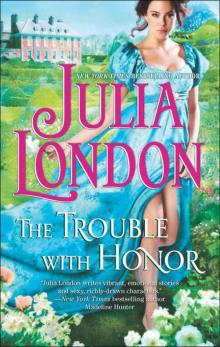 The Trouble with Honor
The Trouble with Honor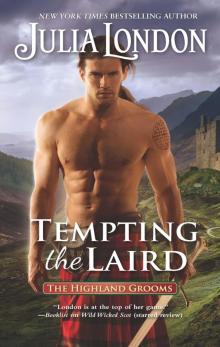 Tempting the Laird
Tempting the Laird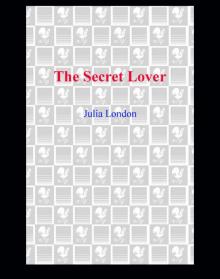 The Secret Lover
The Secret Lover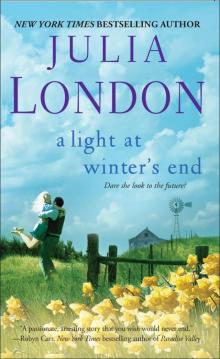 A Light at Winter’s End
A Light at Winter’s End The Charmer in Chaps
The Charmer in Chaps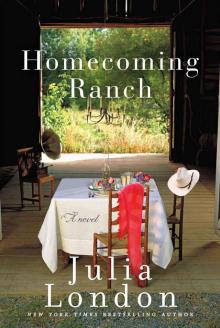 Homecoming Ranch
Homecoming Ranch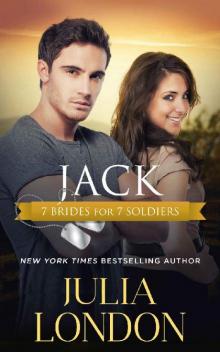 Jack (7 Brides for 7 Soldiers Book 5)
Jack (7 Brides for 7 Soldiers Book 5)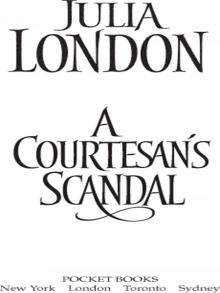 A Courtesan's Scandal
A Courtesan's Scandal Hard-Hearted Highlander--A Historical Romance Novel
Hard-Hearted Highlander--A Historical Romance Novel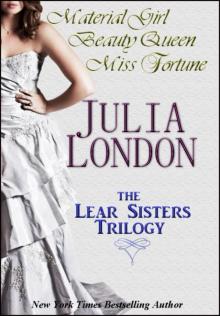 The Complete Novels of the Lear Sister Trilogy
The Complete Novels of the Lear Sister Trilogy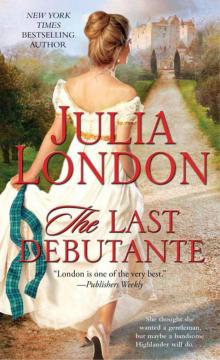 The Last Debutante
The Last Debutante Suddenly Single (A Lake Haven Novel Book 4)
Suddenly Single (A Lake Haven Novel Book 4) Seduced by a Scot
Seduced by a Scot Highlander Unbound
Highlander Unbound Suddenly Dating (A Lake Haven Novel Book 2)
Suddenly Dating (A Lake Haven Novel Book 2)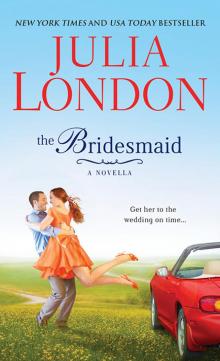 The Bridesmaid
The Bridesmaid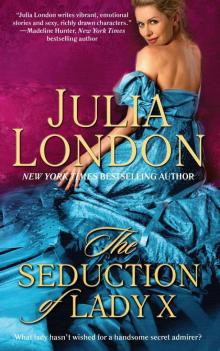 The Seduction of Lady X
The Seduction of Lady X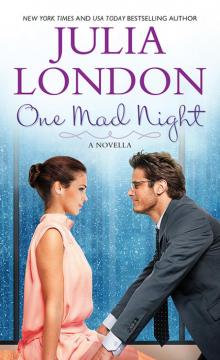 One Mad Night
One Mad Night Extreme Bachelor
Extreme Bachelor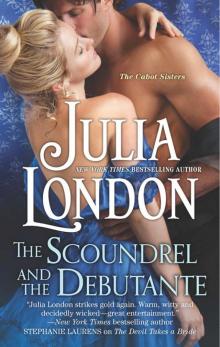 The Scoundrel and the Debutante
The Scoundrel and the Debutante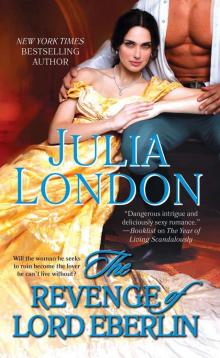 The Revenge of Lord Eberlin
The Revenge of Lord Eberlin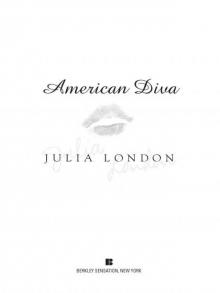 American Diva
American Diva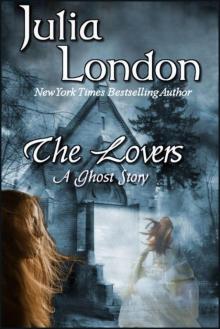 The Lovers: A Ghost Story
The Lovers: A Ghost Story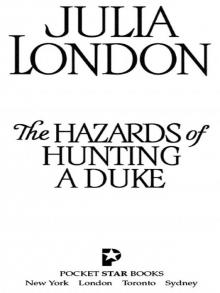 The Hazards of Hunting a Duke
The Hazards of Hunting a Duke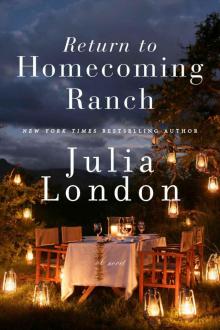 Return to Homecoming Ranch (Pine River)
Return to Homecoming Ranch (Pine River)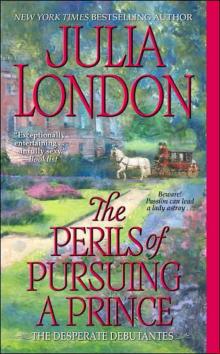 The Perils of Pursuing a Prince
The Perils of Pursuing a Prince Highlander in Love
Highlander in Love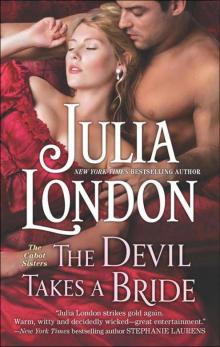 The Devil Takes a Bride
The Devil Takes a Bride Devil in Tartan
Devil in Tartan Wild Wicked Scot
Wild Wicked Scot Snowy Night with a Highlander
Snowy Night with a Highlander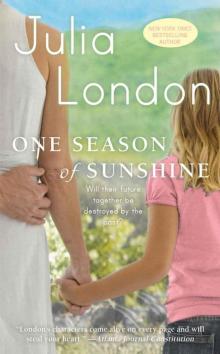 One Season of Sunshine
One Season of Sunshine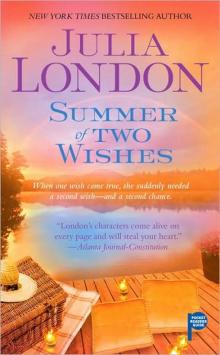 Summer of Two Wishes
Summer of Two Wishes All I Need Is You aka Wedding Survivor
All I Need Is You aka Wedding Survivor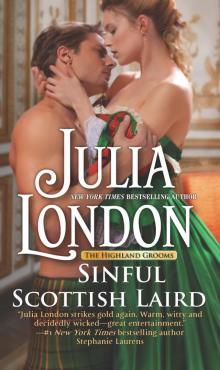 Sinful Scottish Laird--A Historical Romance Novel
Sinful Scottish Laird--A Historical Romance Novel Suddenly Engaged (A Lake Haven Novel Book 3)
Suddenly Engaged (A Lake Haven Novel Book 3)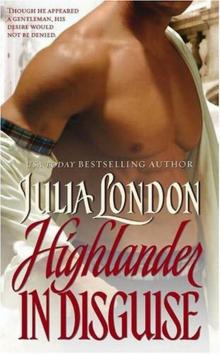 Highlander in Disguise
Highlander in Disguise Suddenly in Love (Lake Haven#1)
Suddenly in Love (Lake Haven#1)